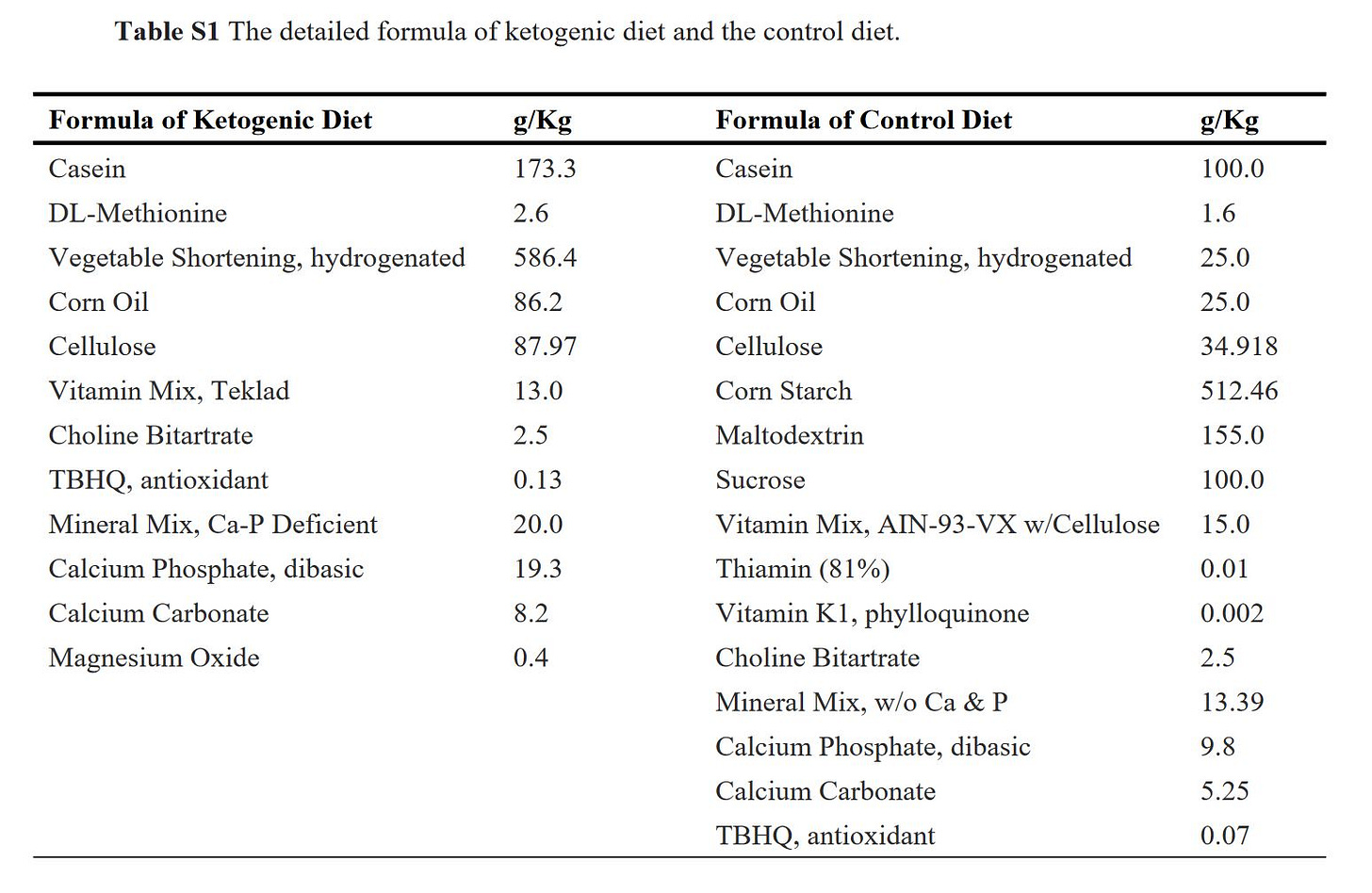Good Keto vs. Bad Keto
tldr: How to make sure that your keto diet is optimally constructed, and is as healthy as possible.
This is what passes for a keto diet in the rodent literature.
It's Envigo's TD.96355, from a paper finding negative effects of a keto diet.
"Ketogenic diet aggravates colitis, impairs intestinal barrier and alters gut microbiota and metabolism in DSS-induced mice." (Li et al., 2021)
F3666 is another rodent keto diet, (Lecker, 2011). It's also high in seed oils, and it's also commonly used.
Virta Health explicitly advises patients to limit seed oil consumption (Phinney et al., 2020), based on Phinney's laboratory experience and self-experimentation, in which he found seed oils to be acutely, albeit mildly, toxic:
"Back in the day when Steve did his study with the bike racers on the ketogenic diet, they had to measure precisely how much of each nutrient his subjects were eating. That limited him to just five menu items from which his subjects could choose each day. Three of these were composed principally of animal fats and two used soybean oil mayonnaise as their fat source. Within a week or two of starting the high fat diet, most of the subjects developed a strong distaste for the mayonnaise-based meals. Opening a new container and then switching brands of mayonnaise didn’t help. Nobody actually got sick eating these tuna salad or chicken salad entrees – they just said that they didn’t feel completely well after eating them.
"Out of curiosity, Steve put himself on a ketogenic diet for a month and fed himself most of his fat intake overnight via a tiny feeding tube in his stomach (so taste wasn’t an issue). Within 3 days of feeding himself 1500 Calories of either soybean or corn oil nightly, he developed quite prominent nausea and gastro-intestinal upset. However when he fed himself the same amount of calories as olive oil for two straight weeks, he had no such symptoms. In between testing these different oils via the feeding tube, Steve maintained nutritional ketosis and met his full calorie needs by eating mostly animal fats, again without symptoms." (Phinney & Volek, 2012)
We need to be cognizant of this pollution of the literature on safety and efficacy of keto diets due to non-evolutionarily appropriate fat compositions. Especially in a study like the above, where it's clearly confounded based on human data as shown in the literature (Fuehrlein, et al., 2004; Rose, et al., 1965; Wood, 2010).
“Most significantly, the risk of developing ulcerative colitis was more than doubled for the highest quartile of dietary linoleic acid intake (odds ratio [or] 2.49, 95% Ci 1.23–5.07, P = 0.01) when adjusted for center, gender, age at recruitment, energy intake and cigarette smoking. the authors suggest that “if the association is a causative one then 30% of all cases could be attributed to such higher intakes.” (Wood, 2010)
The same can be found in the human literature looking at variations of Kossoff's medical ketogenic diet (which he has largely abandoned), (Kossoff & Wang, 2013).
P.S. After noting the negative effects of long-term application of F3666: "It should be noted that the KD studied here would not be studied in or prescribed for humans." (Garbow 2011)
Envigo. (2015). TD.96355 Ketogenic Diet. Envigo. https://www.envigo.com/fat-lipid-adjusted-custom-diets
Fuehrlein, B. S., Rutenberg, M. S., Silver, J. N., Warren, M. W., Theriaque, D. W., Duncan, G. E., Stacpoole, P. W., & Brantly, M. L. (2004). Differential Metabolic Effects of Saturated Versus Polyunsaturated Fats in Ketogenic Diets. The Journal of Clinical Endocrinology & Metabolism, 89(4), 1641–1645. https://doi.org/10.1210/jc.2003-031796
Garbow, J. R., Doherty, J. M., Schugar, R. C., Travers, S., Weber, M. L., Wentz, A. E., Ezenwajiaku, N., Cotter, D. G., Brunt, E. M., & Crawford, P. A. (2011). Hepatic steatosis, inflammation, and ER stress in mice maintained long term on a very low-carbohydrate ketogenic diet. American Journal of Physiology-Gastrointestinal and Liver Physiology, 300(6), G956–G967. https://doi.org/10.1152/ajpgi.00539.2010
Kossoff, E., & Wang, H.-S. (2013). Dietary Therapies for Epilepsy. Biomedical Journal. https://doi.org/10.4103/2319-4170.107152
Lecker, J. (2011, January). Ketogenic Diet F3666 [Advertisement]. Bio-Serv. https://www.bio-serv.com/product/Ketogenic_Diet.html
Li, S., Zhuge, A., Wang, K., Lv, L., Bian, X., Yang, L., Xia, J., Jiang, X., Wu, W., Wang, S., Wang, Q., & Li, L. (2021). Ketogenic diet aggravates colitis, impairs intestinal barrier and alters gut microbiota and metabolism in DSS-induced mice. Food & Function. https://doi.org/10.1039/d1fo02288a
Phinney, S. D., & Virta, T. (2020, February 4). Which fats and oils should I eat on a ketogenic diet? [Advertisement]. Virta Health. https://virtahealth.webflow.io/faq/fats-oils-ketogenic-diet
Phinney, S., & Volek, J. S. (2012). The Art and Science of Low Carbohydrate Performance. Beyond Obesity LLC. https://www.google.com/books/edition/The_Art_and_Science_of_Low_Carbohydrate/KrNeMwEACAAJ?hl=en
Rose, G. A., Thomson, W. B., & Williams, R. T. (1965). Corn Oil in Treatment of Ischaemic Heart Disease. British Medical Journal, 1(5449), 1531–1533. https://www.bmj.com/content/1/5449/1531
Wood, N. J. (2010). High dietary intake of linoleic acid more than doubles the risk of ulcerative colitis. Nature Reviews Gastroenterology & Hepatology, 7(2), 65–65. https://doi.org/10.1038/nrgastro.2009.224







You don't have to read much to note the absurdity.
"Vegetable Shortening, hydrogenated 586.4 g/Kg" - cruelty to animals.
It is actually worse than this. Any study that uses two diets that don't have the exact same base diet are not real science. In real science - we only change ONE variable. If you have two research diets - often from two companies - the base of the diet is not the same - thus multiple variables.
This is a failure even at high-school level science - high fat diets that have added sugar and no fat - (vegetable oils are not 'fat') - the rule is garbage studies - not science.